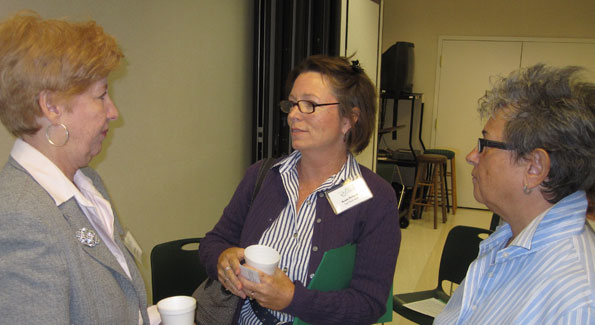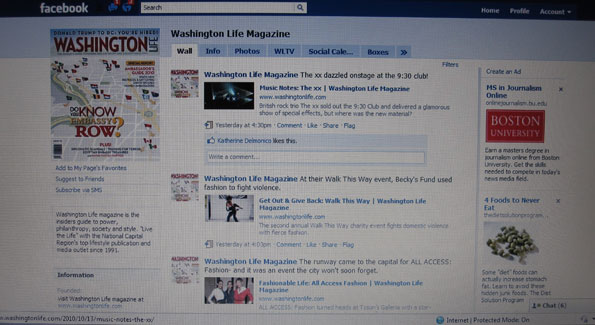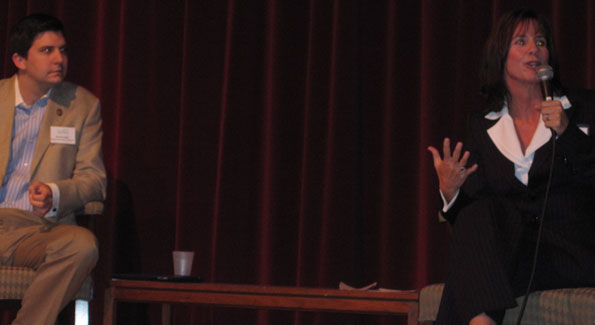Nearly 300 nonprofit, board and community leaders gathered for the sixth annual ACT for Alexandria’s Annual Nonprofit Excellence Forum to hear about the benefits of using social media.
By Jane Hess Collins

Bonnie Baxley, Executive Director of Community Lodgings, talks with CJ Mikowski and Susan Driscoll. Photo by Jane Hess Collins.
Allison Cryor DiNardo, ACT for Alexandria’s Chair, and Jim Taylor, Capital One’s Director of Community Banking for the Mid-Atlantic Region, opened the forum held on Wednesday, October 13, at the First Baptist Church of Alexandria’s Meeting Center.
Former Virginia First Lady Lisa Collis, Director of the Collis-Warner Foundation, introduced keynote speakers Jean Case, Chief Executive Officer of the Case Foundation and former marketing director of American Online, and David B. Smith, Executive Director of the National Conference on Citizenship and founder of mobilize.org. It was no surprise that they promoted the virtues social media to the nonprofit directors.
To Tweet or not to Tweet?
“If you’re not engaged in these new technologies, you’re being left behind,” said Case. But nonprofits need not worry. They’re already leading the charge in leveraging social media, she said, citing a University of Massachusetts report published earlier this year. Case urged those nonprofits that aren’t already on the social media bandwagon to jump on, and bring along their advocates and champions.
Case acknowledged the skeptics in the audience by saying, “I don’t blame you” then listed the benefits of using social media. “These things work. They make a difference. They grow awareness. They grow your brand. They provide revenue or donations. They can expand your reach. They can more closely connect your followers or your donors to the work that you are doing.”
Start small, Case advised those tiptoeing into the social media pool. And don’t worry if you’re just getting started. “It’s actually really easy to jump in,” she promised. The secret, she said, is to ask the people you want following you what they want, rather than copying what other nonprofits do. “You really can’t create strategy in a conference room,” Case said. “It has to be authentic.”
So Much Technology, So Little Money

Social media, like Facebook and Twitter, bring more bang for the buck than a static website, according to Jean Case of the Case Foundation. Photo by Jane Hess Collins.
With limited money, time and staff, what’s a small nonprofit to do when deciding how to leverage technology? Reach out with social media like Facebook and Twitter, and start small. Post one or two Facebook and Twitter messages daily. Website content is still important, since Facebook and Twitter posts should, in most cases, direct followers there. Using social media is much more effective than waiting for someone to find your website, said Case. And if it you don’t notice an increase in website visits or interest, tweak your strategy.
And the big winner? Twitter, said Smith and Case, for its huge leverage factor and zero cost. “Twitter gets 90 million tweets a day and surpasses Facebook in terms of number of actually opened links by 19 to 1,” Case said. Smith illustrated the power of Twitter when the National Conference on Citizenship’s annual conference, which normally includes 300 to 1,000 attendees, reached over 973,000 people through tweets and retweets last year.
The Next Greatest Generation
Use the millennial generation (or Gen Y or the Echo Boom generation, which includes anyone born between 1976 and 1996, according to mobilize.org), said Case. Calling them “the next greatest generation,” she said that millennials “live and breathe social media” and suggested that nonprofit directors include them on social media strategy planning or on the board of directors. The millennial generation adds value to your organization, thinks differently and represents the future, Case said.
What’s Next?
Mobile phones (including smart phones) are the next big thing. More and more content is taking place on mobile phones, Case said, adding that “in 2012 the shipments of mobile [phones] worldwide will exceed the combined shipments of laptops and PCs.”
Online games that create good, such as Farmville or freerice.com, are also huge. Two big consumer trends worth watching are localization and Groupons (awesome idea. I signed up for it while I was writing this). Merchants, both local and national, are looking for ways to give back and do good, so nonprofit directors should think of creative ways to partner with them.
And the Final Verdict…
ACT for Alexandria Executive Director John Porter was thrilled with positive feedback from the participants. “You could just feel it working,” he said, adding that Case and Smith did an exceptional job of encouraging nonprofit directors to include social media in their operations.
Attendees also gave high marks for the panel members and content provided in the each of the three breakout sessions on community building/civic engagement, fundraising and marketing that followed the keynote presentation.
Websites to Get You Started on your Social Media Adventure…
Casefoundation.org (democratizes philanthropy, encourages civic engagement, and promotes new and innovative technologies to make giving more informed, efficient, and effective)
Facebook.com
Nten.org (a nonprofit technology network where members use technology for their causes)
Paper.li (aggregate Facebook and Twitters posts and publishes a virtual “newspaper”)
Twitter.com

David B. Smith and Jean Case convince Alexandria's nonprofit directors of the value of social media. Photo by Jane Hess Collins.
Jane Hess Collins is a retired Air Force colonel who writes to inspire people to contribute. She is also a public speaker, conducts workshops for clients to discover their most intrinsic way to serve, and has established game nights for at-risk families throughout the country. You can contact her for speaking engagements or workshops at www.getoutandgiveback.com.
